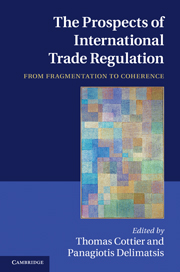Book contents
- Frontmatter
- Contents
- List of figures
- List of tables
- Contributors
- Preface and acknowledgements
- Table of cases
- List of abbreviations
- Introduction: fragmentation and coherence in international trade regulation: analysis and conceptual foundations
- PART I Constitutional issues in international trade regulation
- PART II Reforming specific areas of trade regulation
- PART III ‘Trade and…’ linkages
- Index
Preface and acknowledgements
Published online by Cambridge University Press: 26 April 2011
- Frontmatter
- Contents
- List of figures
- List of tables
- Contributors
- Preface and acknowledgements
- Table of cases
- List of abbreviations
- Introduction: fragmentation and coherence in international trade regulation: analysis and conceptual foundations
- PART I Constitutional issues in international trade regulation
- PART II Reforming specific areas of trade regulation
- PART III ‘Trade and…’ linkages
- Index
Summary
Fragmentation and coherence in international trade regulation are the core theme of this volume. For a long time, the General Agreement on Tariffs and Trade (GATT) led a life of its own in a self-contained regime. The evolution from tariff to non-tariff barriers brought about increasing overlaps with other regulatory areas, partly pertaining to core areas of domestic regulation. World Trade Organization (WTO) rules increasingly have an impact on other areas of law and policy, including environmental protection, agricultural and regional policies, labour standards, investment, human rights, culture and regional integration. Vice versa, other regulatory areas have an impact on trade rules. The process has resulted in tensions and challenges to the multilateral trading system with which the WTO has been confronted since its inception in 1995. Against this backdrop, this book offers an attempt to examine fragmentation in international trade regulation across a wide array of regulatory fields through the lens of a conceptually coherent theoretical framework. The effort to bring about greater coherence among different policy goals and fields, and thus to embed the multilateral trading system within the larger framework of international economics, law and international relations is the common thread connecting all chapters of this book and the proposals for reform which they submit.
- Type
- Chapter
- Information
- The Prospects of International Trade RegulationFrom Fragmentation to Coherence, pp. xvii - xixPublisher: Cambridge University PressPrint publication year: 2011



